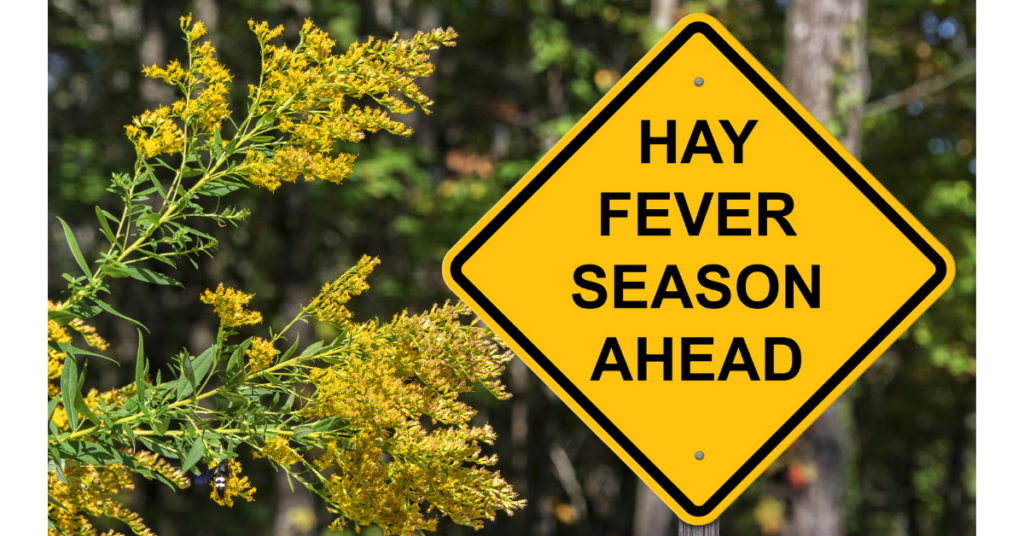What is hay fever?
A seasonal form of Allergic rhinitis (inflammation in the nose), hay fever occurs when the immune system overreacts to specific allergens in the air, such as pollen, dust mites, or pet dander.
(See also our articles on Allergy / Allergies and Allergy Testing)
Signs and Symptoms
While we welcome warmer weather with open arms, we’re less keen on the hay fever often brings with it.
If spring and summer see you struck down with streaming eyes, a blocked nose, or a killer headache, you’ll know there’s so much more to hay fever than a few sneezes.
Many hay fever sufferers opt to stay inside to avoid the onset of symptoms. This can further compound the problem as we get vitamin D from sun exposure – and if we can’t get out due to allergies – we are missing out on this important substance that has numerous roles in the maintaining the body, including helping us to be more resilient to allergens.
While over-the-counter medicines often help to reduce symptoms, these can bring annoying side effects such as drowsiness. Moreover, these drugs can actually worsen hay fever symptoms as they dry out our mucus membranes – thus compounding the problem.
Luckily there are plenty of natural hay fever remedies that actually work to lessen the symptoms:
Complementary therapies for hay fever
Acupuncture
Acupuncture helps balance the body’s energy system and immune response and is effective for anxiety, stress, and overall health. However, the ancient Indian practice of marmapuncture, a specific type of acupuncture that uses fewer needles, can particularly help with hay fever because our reaction to pollen is an immune response – it’s your body’s way of dealing with an irritant, and marmapuncture calms down the immune response.
Homeopathy
This gentle but highly effective approach is the go-to for dealing with hay fever. Ideally, one should go to the homeopath as early in the year as possible so that a ‘constitutional remedy’ can be prescribed, which addresses any imbalances you may have in their entirety. This can, in many cases, eliminate allergic responses, such as hay fever, entirely. However, if you miss the opportunity to get make an appointment early, then still go – even at the height of hay fever season – as the homeopath will be able to prescribe an ‘acute’ remedy that you can take for symptomatic relief.
These remedies, often made from minute amounts of grass and tree pollens, get to work extremely rapidly and symptoms are dramatically reduced within a few minutes with no harmful side effects.
Nutrients and Supplements that can help
Quercetin
Research has shown that the flavonoid quercetin has a powerful antihistamine effect, which is capable of reducing inflammation. Rather than just blocking the effects of histamine, like most over-the-counter hay fever medications, quercetin inhibits its release in the body, effectively halting the reaction before it can take place.
Biotin
Biotin is a water-soluble B vitamin that plays an essential role in many bodily functions. It helps to keep the mucous membranes healthy and able to fight off infections. Biotin also helps the body convert food into energy and promotes healthy hair, skin, and nails.
Some of the best sources of biotin are avocados; green leafy vegetables such as spinach, Swiss chard, and kale; whole grains; and nuts such as almonds and walnuts.
Garlic
This is a fantastic ingredient that adds flavour while also providing relief from hay fever symptoms. By blocking the production of histamine, garlic can help reduce overall sensitivity to allergens and make it easier for your body to deal with exposure. For best results, try to incorporate garlic into your meals in some way every day. To get the most powerful anti-hay fever effect, chop your garlic well and leave to stand for a few minutes as oxygen exposure increases it therapeutic allicin levels.
Turmeric
This yellow spice – related to ginger – is known for its healing powers, and it has powerful anti-inflammatory properties that can help to ease nasal congestion for hay fever sufferers.
Herbal teas for hay fever
Certain herbs have a natural antihistamine effect. Opt for green tea, chamomile, elderflower, ginger, peppermint, and anise; sip these herbal teas throughout the day to limit the effects of hay fever. They will also help to keep you hydrated, so it’s a win-win.
Probiotics for hay fever
Healthy gut flora is essential for a strong immune system. To really help replenish your gut flora, opt for a multi-strain probiotic supplement. You can also get probiotics naturally through fermented foods such as sauerkraut, kimchi, and a variety of live yoghurts – check the ingredients for live cultures.
Finally – cut out dairy
Dairy products increase the production of mucus in your respiratory tract, worsening hay fever symptoms. The good news is there are so many delicious alternatives these days. Try switching to plant milk such as oat or almond, and vegan butter and cheese.
(See also our articles on Acupuncture, Elderflower – Herbal Remedy, and Al Cepa – Homeopathic Remedy)

